View the WCRI 2022 Photo Gallery
7th World Conference on Research Integrity
Cape Town, South Africa
29 May – 1 June 2022
7th World Conference on Research Integrity
Cape Town, South Africa
29 May – 1 June 2022
7th World Conference on Research Integrity
Cape Town, South Africa
29 May – 1 June 2022
The following information will be updated as the programme evolves. Please subscribe to our mailing list for programme and conference updates.
- Conference Theme
- Plenary Speakers
- Programme at a Glance
- Steneck-Mayer Lecture
- Pre-conference Workshops
- Doctoral Forum
- Plenary Sessions
- Symposia
- Focus Track
- Concurrent Sessions
- Poster Sessions
- Meet the Expert Sessions
- WCRI Awards
- WCRI 2021 Virtual
Conference Theme
The overarching theme of the 7th WCRI is Fostering Research Integrity in an Unequal World.
Conference subthemes include current global research integrity discussion areas such as:
- Research Integrity as a driver of research excellence and public trust
- Ethical best practice in authorship, publication and the use of research metrics
- Best practice in detection, investigation, and responding to research misconduct
An additional emerging subtheme included is:
- Ensuring research integrity in the context of the 4th Industrial Revolution (the convergence of the physical, biological, and digital world)
As this conference is in Africa for the first time, some additional subthemes particularly relevant to many African and Low and Middle Income (LMIC) Countries are included:
- Colonial legacies and research integrity: moving forward by building equity into research
- Counteracting plagiarism in multicultural and multilingual contexts
- Institutionalising Responsible Conduct of Research (RCR) education and training, including curriculum development and implementation in low resource settings
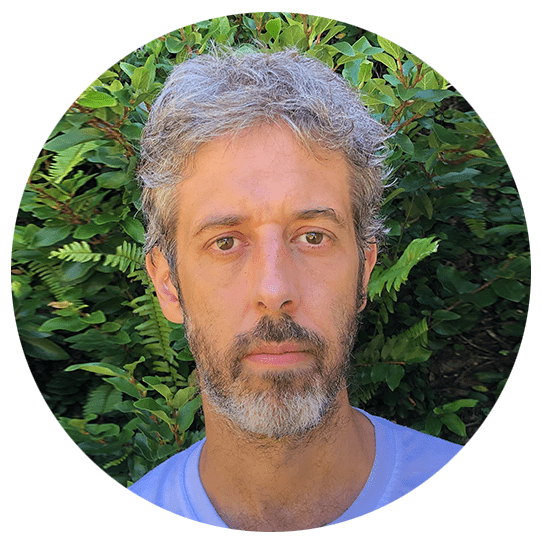 |
Prof. Olavo B. AmaralOlavo Amaral is an associate professor at the Institute of Medical Biochemistry at the Federal University of Rio de Janeiro, Brazil. He obtained his PhD at the Federal University of Rio Grande do Sul, studying the neurobiology of memory using rodents and neural network models. In recent years, his interests have largely switched to metaresearch on how to improve the reproducibility of published science. He currently coordinates the Brazilian Reproducibility Initiative, a multicenter systematic replication of experiments from Braziian biomedical science involving more than 60 labs across the country. Plenary session: How enhanced data can enhance research integrity |
|
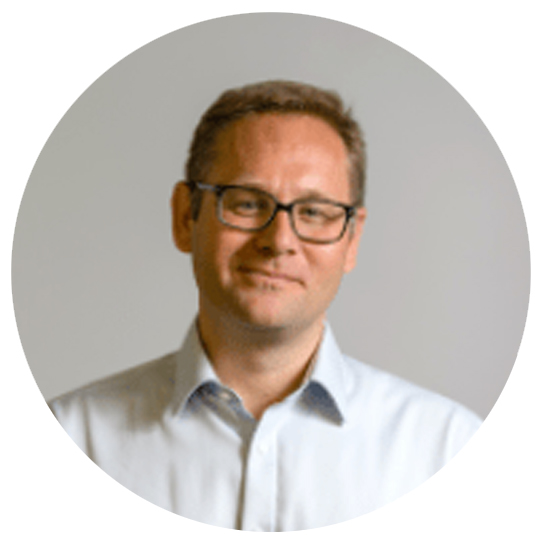 |
Phil BatyPhil Baty is an international authority on university performance and strategy, with more than 25 years of experience in global higher education, including a decade (2009-2019) as editor of the prestigious Times Higher Education (THE) World University Rankings and its derivative analyses. He is a sought-after speaker, commentator and consultant and he currently leads government affairs activities at THE, the trusted global data and insights partner for the higher education sector. Phil was the creator of the THE World Academic Summit and he oversees the team that organises the summit and THE’s extensive series of international events and awards, which now engage more than 40,000 university leaders, academics, business executives and policymakers annually. Phil was listed as one of the top 15 “most influential” in education by The Australian newspaper in 2012 and in the 2016 book, Global University Rankings and the Mediatization of Higher Education, he is described as “one of the most powerful commentators, and arguably policy actors, on higher education”. Phil joined Times Higher Education (THE) in 1996, and served as chief reporter, news editor, deputy editor, editor-at-large and editorial director, before taking his current role as chief knowledge officer. He took over responsibility for the World University Rankings in 2008 and led the development of the current THE World University Rankings methodology, determining the 13 performance indicators and weightings currently used to evaluate world-class research universities. Phil is an award-winning journalist. He picked up the Ted Wragg Award for Sustained Contribution to Education Journalism (CIPR) in 2010 and was a runner-up for the Paul Foot Award for Campaigning Journalism, run by The Guardian and Private Eye magazine in 2007. He contributes regularly on global higher education for leading newspapers and broadcasters around the world. He can be found on Twitter, Instagram and on LinkedIn. Plenary session: Impact of research assessment and institutional ranking on research integrity |
|
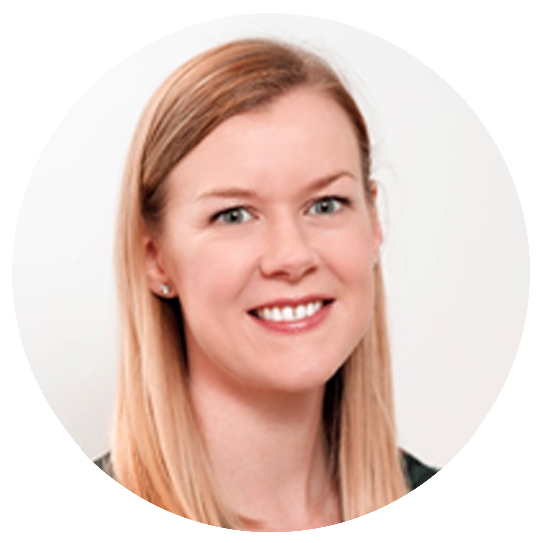 |
Dr. Gillian CurrieDr Currie is a postdoctoral researcher in the Centre for Clinical Brain Sciences at the University of Edinburgh. Gillian is an executive member of CAMARADES- an international collaboration that supports, advances and undertakes systematic reviews of preclinical research. She is specialised in preclinical meta-research and drives improvements in the validity of preclinical research. Her research interests also include applying research improvement methodology to the academic setting and developing resources to increase the validity of preclinical research. One such resource is EUROC (Edinburgh University Research Optimisation Course), an online course, which aims to provide all researchers and personnel working with animals with the knowledge to increase the rigour of their studies. Plenary session: How enhanced data can enhance research integrity |
|
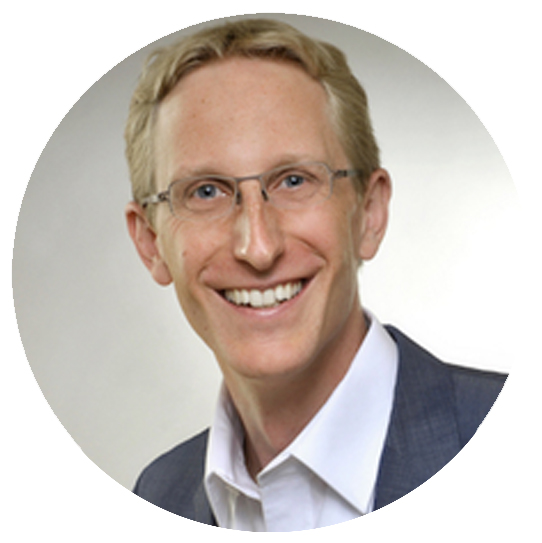 |
Björn GerlachBjörn Gerlach is co-founder and chief operational officer at PAASP GmbH and co-founder and treasurer of the “Guarantors of EQIPD” society, both located in Heidelberg, Germany. He studied biology and obtained his PhD at Imperial College London, UK. Subsequently, he did research in a pharmaceutical company and became an entrepreneur in 2015 with PAASP, the first full-service evaluation firm to analyze risks in biomedical research. In 2021, he co-founded the “Guarantors of EQIPD” society, a non-profit organization in Germany to ensure governance of the EQIPD quality system. Plenary session: How enhanced data can enhance research integrity |
|
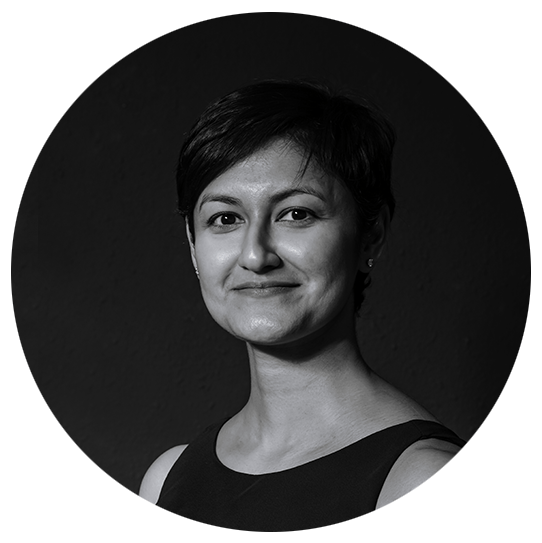 |
Dr. Gowri GopalakrishnaGowri Gopalakrishna is an epidemiologist with private & public health policy experience ranging from government to pharmaceuticals to non-governmental organizations. Her notable contributions include her role in the SARS outbreak in Singapore in 2003. She is also part of the Dutch Covid 19 national response and has been involved in commenting on the impact of speed science, open science and research integrity. Currently she leads the Dutch National Survey on Research Integrity, the largest research integrity survey to-date worldwide. She is Editorial Board member of BMC Medical Research Methodology and is based at the Amsterdam University Medical Centres, Netherlands. Plenary session: Important work by early and mid-career researchers |
|
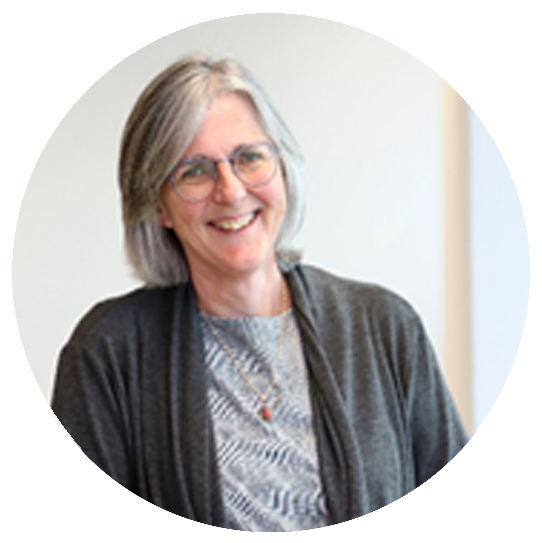 |
Professor Sue HarrisonProfessor Sue Harrison’s portfolio includes advancing the research quality, quantity and impact across the university, enhancing UCT’s African agenda, internationalization and research partnerships, growing and transforming the postgraduate sector and oversight of interdisciplinary university research institutes. She has a long, varied track record in management and leadership, starting with her headship of Chemical Engineering some 20 years back, through serving as Deputy Dean: Postgraduate and Research for 6 years. Her research and teaching career extend over some 30 years. She has led research groupings and championed interdisciplinary research capacity at UCT, as well as the role of soft-funded researchers. Her contribution to UCT’s research management is shown through her ongoing involvement with research and postgraduate committees and working groups at UCT. Her contribution to research nationally has been demonstrated through her leadership role in the nurturing of innovation and in the implementation plans for the bioeconomy strategy. Plenary session: Towards a Cape Town Statement: Fair and equitable partnerships as an essential basis for research integrity and development |
|
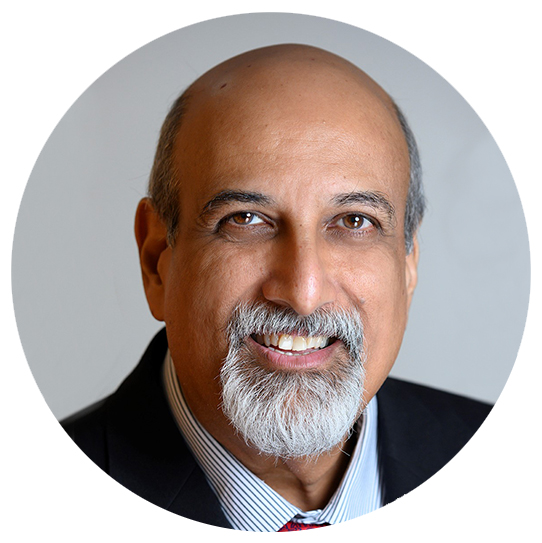 |
Professor Salim KarimProfessor Salim S Abdool Karim is a clinical infectious diseases epidemiologist widely acknowledged for his scientific contributions and leadership in AIDS and Covid-19. He is the Director of CAPRISA (Centre for the AIDS Programme of Research in South Africa) and Professor of Global Health at Columbia University. He is an Adjunct Professor at Cornell and Harvard Universities and Pro Vice-Chancellor at the University of KwaZulu-Natal. He has served as President of the South African Medical Research Council. He is a member of the WHO Science Council and the WHO TB-HIV Task Force. He is Vice-President of the International Science Council. He is a member of the Africa Commission on Covid-19 and The Lancet Commission on Covid-19. Plenary session: Data, research and integrity in the time of a global pandemic |
|
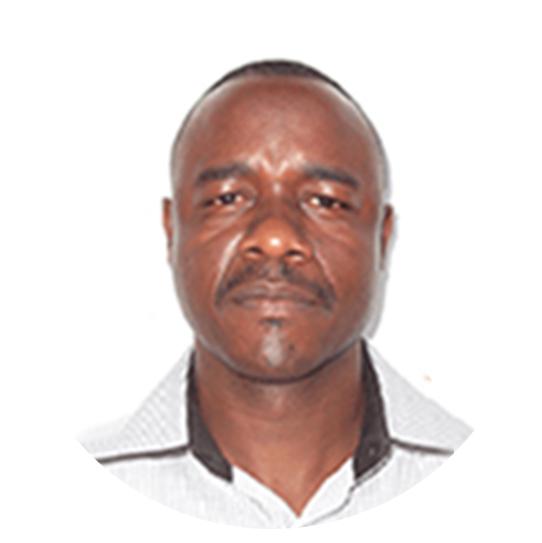 |
Mr Francis KombeMr. Francis Kombe is a co-founder and steering committee member of the African Research Integrity Network (ARIN) and the Chief Executive Officer of EthiXPERT; a non-profit company based in Pretoria, SA. He is also a founding member and chair of the Ethics, Community Engagement and Patients Advocacy and Support (ECEPAS) Working Group under the Global Emerging Pathogen Treatment Consortium (GET). A UNESCO trained teacher of ethics and an appointed Member of International Forum of Teachers of the UNESCO Chair in Bioethics, Mr Kombe has a keen interest and passion in research ethics, capacity building and community engagement, with over 20 years of experience applying these skills in the context of international collaborative health research. Mr. Kombe holds a Master of Social Science in Health Research Ethics from the University of KwaZulu Natal (UKZN), in SA, Master of Public Health and Post-Graduate Diploma in Public Health from London School of Hygiene and Tropical Medicine (LSHTM) and is currently pursuing a Wellcome Trust funded PhD at UKZN with a focus on Research Integrity. He is a winner of the 2015 Pillars of Public Responsibility in Medicine and Research (PRIM&R) Award and has served as a member of the WCRI programme committee since 2018. |
|
 |
Prof. Amos LaarProfessor Amos Laar has academic training in Nutrition, Public Health, and Bioethics. His earlier research principally explored the “socio-cultural, socio-ethical, and medico-ethical dimensions of HIV. Currently, his research and professional practice focus on three distinct, yet related areas of public health: Public Health Nutrition (in particular food environment; food systems); Bioethics (e.g. food ethics, ethics & public health; health & human rights); and Social Public Health (e.g. how structural violence and other social forces affect the realization of health). Taken together, his research contributes to a deeper understanding of how physical environments, social environments, and structural factors affect health. He is an active researcher having served as Principal/Co-Investigator of over 20 successful research grants at the University of Ghana, Accra, Ghana. Prof. Laar is a Co-Principal Investigator and Ghana-Lead of an NIH-funded Research Integrity Training Program which has trained 30 Research Integrity Fellows, and has facilitated the establishment of a MSc. programme in Bioethics at the University of Ghana – the first of such in Ghana. Plenary session: Fostering research integrity in universities: perspectives from African researchers |
|
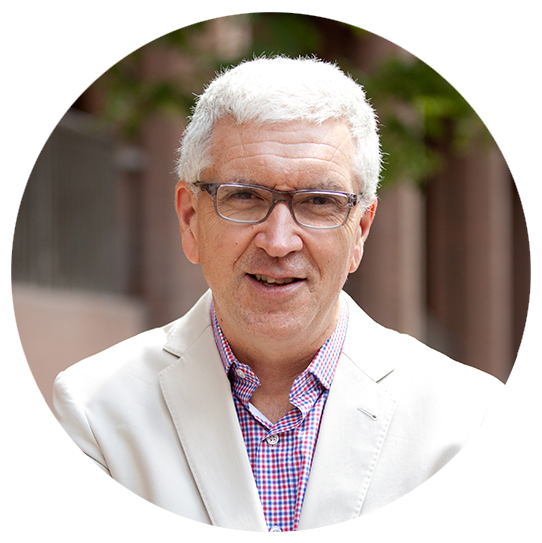 |
Prof. James "Jim" Lavery(Virtual Attendance, Recorded) Jim Lavery is the inaugural Conrad N. Hilton Chair in Global Health Ethics, Professor in the Hubert Department of Global Health in the Rollins School of Public Health, and Faculty of the Center for Ethics, Emory University, Atlanta, Georgia. Prior to joining the Emory faculty, he was a Research Scientist and Managing Director of the Centre for Ethical, Social & Cultural Risk at the Li Ka Shing Knowledge Institute of St. Michael's Hospital, and an Associate Professor in the Dalla Lana School of Public Health, Institute of Medical Science, and Joint Centre for Bioethics at the University of Toronto. Jim was the co-principal investigator of the Ethical, Social and Cultural (ESC) Program for the Bill & Melinda Gates Foundation's Global Health and Global Development programs from 2005-2015. He is currently leading the development of the Human Engagement Learning Platform (HELP) for Global Health at Emory University, to support funders and implementation partners to improve community and stakeholder engagement and organizational learning in global health and global development programs. He is a Fellow of the Hastings Center and the 2017 recipient of the Global Forum for Bioethics in Research Award for Contributions to Progress in International Research. He is a member of Board of Directors of the Council for Health Research for Development (COHRED) USA, a member of the Scientific and Technical Advisory Committee of the Health Campaign Effectiveness Coalition at the Task Force for Global Health, and a member of the Bioethics Advisory Panel of Pfizer, Inc. Plenary session: Towards a Cape Town Statement: Fair and equitable partnerships as an essential basis for research integrity and development |
|
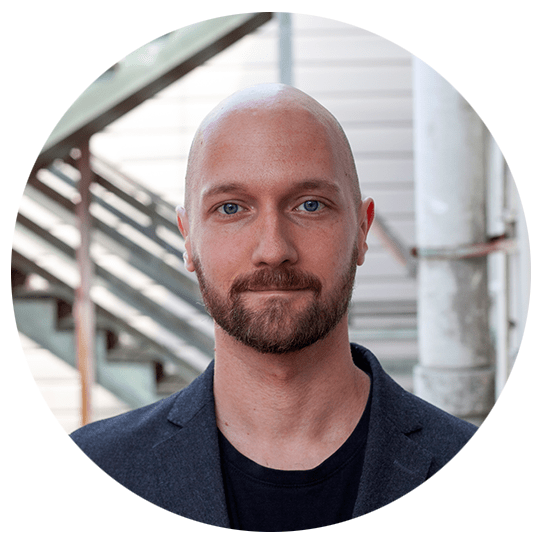 |
Dr. Mario MaličkiAfter finishing School of Medicine at the University of Zagreb, Croatia, Dr Mario Malički obtained an MA in Literature and Medicine at King’s College, London, UK, and then worked at the University of Split School of Medicine, Croatia where he obtained his PhD in Medical Ethics titled: Integrity of scientific publications in biomedicine. From 2017-2019 he has been a postdoc at AMC and ASUS Amsterdam, Netherlands, and in 2020 he joined METRICS at Stanford University, USA where he focuses on meta-research of preprints and peer review. He is also a Co-Editor-in-Chief of Research Integrity and Peer Review journal (RIPR) Twitter: @Mario_Malicki Plenary session: Important work by early and mid-career researchers |
|
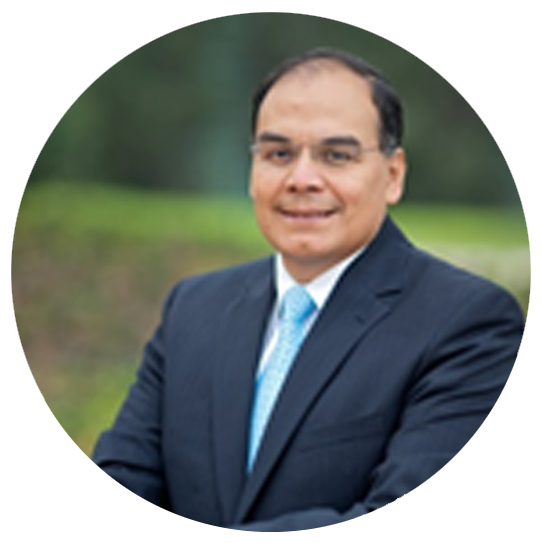 |
Prof. Arturo MolinaProf. Arturo Molina is Vice-Rector for Research and Technology Transfer, full Professor, Researcher, and Leader of the Strategic research group on Product Innovation. He received a Ph.D. in Manufacturing Engineering from the Loughborough University of Technology and a University Doctorate in Mechanical Engineering from the Technical University of Budapest. He received a Master of Science with specialization in Computer Science degree and Bachelor degree in Computer Systems Engineer from Tec de Monterrey. He is co-author of more than 150 scientific articles in journals, editor and author of 15 books, inventor of three patents granted in Mexico and five patent applications in the process (four in Mexico and one in the USA). He is member of the National Researchers System of Mexico (SNI-Level III), Mexican Academy of Sciences, Mexican Engineering Academy, Mexican Academy of Computation. He also participates in international research networks, co-Chair in the Global Universities Network's Climate Change Global Challenge (WUN), Chair of Researcher Leader Group Engagement of Universitas 21 (U21), as Chair of the international federation for Information Processing (IFIP) WG 5.12 Architectures for Enterprise Integration. He is the founder and co-owner of one technology-based company: IECOS - Integration Engineering and Construction Systems. www.iecos.com Plenary session: Impact of research assessment and institutional ranking on research integrity |
|
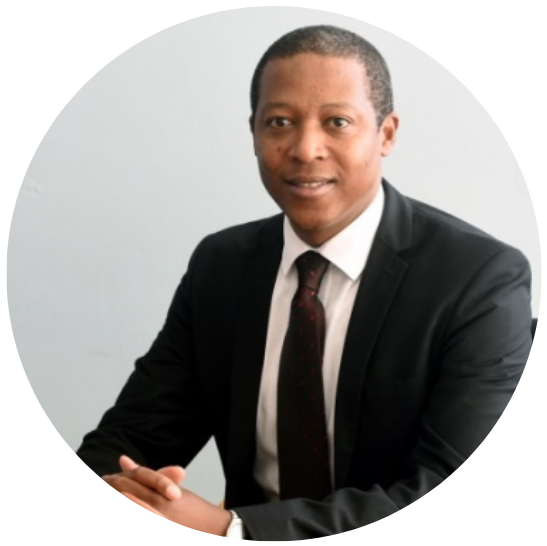 |
Prof. Ntobeko NtusiNtobeko Ntusi, BSc(hons) MBChB DPhil MD FRCP FRSSA, is a cardiologist and a Professor of Medicine, and is the Chair and Head of Medicine at the University of Cape Town (UCT) and Groote Schuur Hospital (GSH). He is a Principal Investigator based at the Hatter Institute for Cardiovascular Research in Africa and the Cape Universities Body Imaging Centre, UCT and a Collaborating Investigator at The Wellcome Trust Centre for Infectious Diseases Research in Africa. He is the Editor in Chief of the South African Heart Journal and serves as Associate Editor for Circulation and BMC Medical Imaging. He has been actively engaged and contributed to improved understanding of cardiomyopathy, inflammatory heart disease and heart failure in South Africa and globally. He is a strong proponent of research integrity. Plenary session: Fostering research integrity in universities: perspectives from African researchers |
|
 |
Dr. Sophia Jui-An PanDr. Pan is an Assistant Research Fellow at the Research Center for Humanities and Social Sciences (RCHSS), National Yang Ming Chiao Tung University, Taiwan. She has a specific interest in the best practices in ethics education, publication ethics in the digital era, and the challenges of supporting research integrity in the face of publication pressures, particularly from an East Asian perspective. She works with incredible scholars in Taiwan to promote research integrity and relevant education, especially with the Center for Taiwan Academic Research Ethics Education (AREE) and Taiwan Association for Academic Ethics Education (TAAEE). She conducts empirical research on research integrity (online) curriculum design and assessments. Twitter: @SophiaJPan Plenary session: Important work by early and mid-career researchers |
|
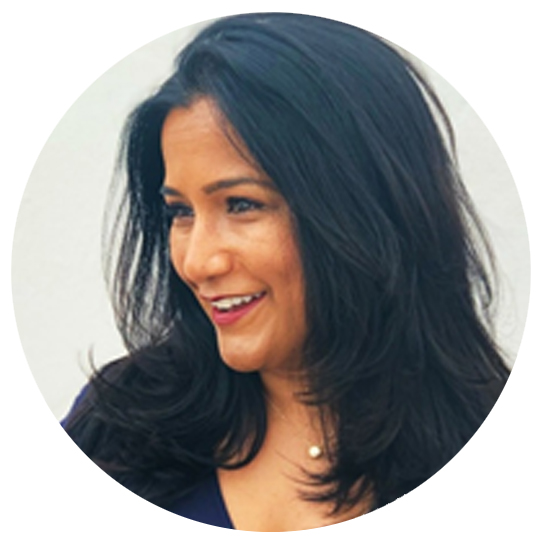 |
Dr. Nandita QuaderiDr Nandita Quaderi is Editor-in-Chief & Editorial VP of the Web of Science. She is responsible for the editorial strategy, policies and practices governing selection for the Web of Science and inclusion in Journal Citation Reports (JCR). She also serves on the Crossref Board of Directors. Before joining Clarivate in 2018, Nandita was Publishing Director at Springer Nature, with overall responsibility for the open access Nature Portfolio journals. Previously she was Editorial Director at BMC. Prior to joining the STM publishing sector, Nandita was a Principal Investigator at the MRC Centre for Developmental Neurobiology at King’s College London where she established her lab investigating the development of the left-right axis during vertebrate development. She joined KCL after completing a post-doctoral fellowship at the Telethon Institute for Genetics and Medicine (TIGEM) in Milan where she discovered the gene for Opitz Syndrome, a defect of midline development. Nandita has a BA in Chemistry from the University of Oxford and a PhD in Molecular Genetics from Imperial College, London. Nandita has taken an active interest in supporting research integrity throughout her career as a researcher, publisher and arbiter of quality across research outputs. She is the co-author of the Institute for Scientific Information (ISI) Global Research Report Research Integrity: Understanding our shared responsibility for a sustainable scholarly ecosystem. Plenary session: Impact of research assessment and institutional ranking on research integrity |
|
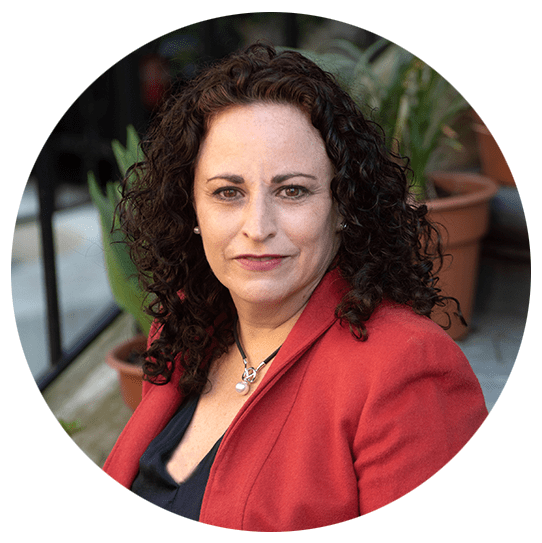 |
Miriam L SabinMiriam is a Senior Editor at The Lancet, in New York City since March, 2020 and the Lancet family of journal’s Preprints editor. Previously, Miriam lived for 12 years in Geneva, Switzerland where she most recently was the Accountability Manager at the Partnership for Maternal, Newborn & Child Health, WHO. Miriam has also worked in the WHO HIV Department, UNAIDS and the Global Fund and a member of the Bulletin of the WHO’s editorial board. Prior to Geneva, Miriam was at the US CDC in the Division of Viral Hepatitis and in the Division of Global HIV/AIDS and in the Epidemic Intelligence Service. Plenary session: Data, research and integrity in the time of a global pandemic |
|
 |
Akhona TshangelaMs. Akhona Tshangela is a trained field epidemiologist with more than 10 years of experience in public health, working in the laboratory, public health programme implementation, surveillance and public health data management. She is currently the interim Principal Program Officer at the Centres for Disease Control and Prevention (CDC) Africa in which she oversees the operations of the Office of the CDC Africa Director and advises on activities that affect agency-wide policy, programmes projects and initiatives. She joined the Africa CDC in 2016 and, as one of the first staff members of the organisation, she played a critical role in launching and developing its programmes. Currently for the COVID-19 response she co-chairs the Science, Regulations and Standards Technical Working Group; under the Africa Task Force on Coronavirus (AFTCOR), a joint partnership between Africa CDC, WHO AFRO and member states. This working group supports member states to make science-based policy decisions She also leads the knowledge management platforms, innovations and research for the COVID-19 response and part of the Steering Committee for the COVID-19 Clinical Research Coalition. Prior to joining Africa CDC, she worked at the Centre for Respiratory Diseases and Meningitis at the NICD. Plenary session: Data, research and integrity in the time of a global pandemic |
|
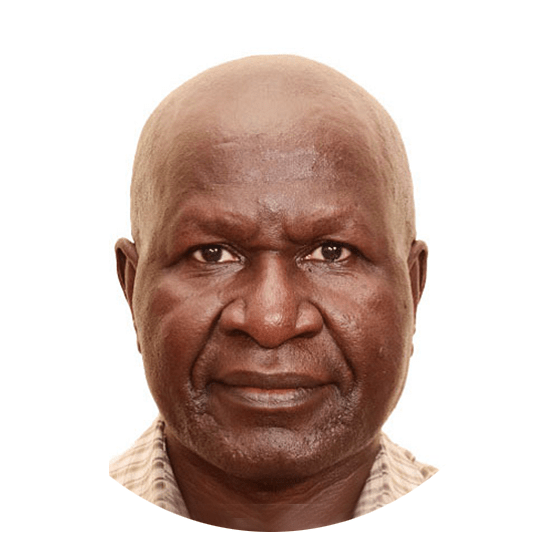 |
Prof. Edwin WereDr. Edwin Were is a Professor of Obstetrics and Gynecology, Moi University School of Medicine and a senior reproductive health specialist with over 20 years of experience in the provision of reproductive health services in the context of a university teaching hospital. He has research and public health training from Johns Hopkins University (Baltimore, MD) 1996, the Arthur Ashe Foundation for Defeat AIDS Fellowship at Cornell University (Ithaca, NY) in 2004, and the University of Washington (Seattle, WA) in 2007. His research interests include HIV prevention research, Maternal Health Research and International Health Research Ethics. He currently chairs Moi University / Moi Teaching and Referral Hospital Institutional Research and Ethics Committee. He is a member of the Medicines san Frontiers Ethics Review Board. He has over 100 publications in peer reviewed international journals. He is the Principal Investigator, Research Integrity Oversight Project supported by the National Institutes of Health. Plenary session: Fostering research integrity in universities: perspectives from African researchers |
|
Programme at a Glance
Please find the draft programme below.
This draft is almost final but is likely to be subject to some last-minute changes and this will be uploaded as necessary.
Click Here to view the programme
Click Here to download the programme
The Steneck-Mayer Lecture
The Steneck-Mayer Lecture is named after Nicholas H. Steneck and Tony Mayer who together started the World Conferences on Research Integrity.
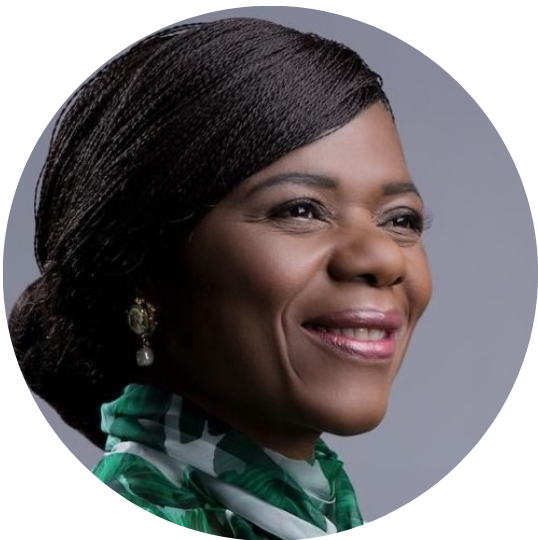
Professor Thulisile “Thuli” Madonsela, an advocate of the High Court of South Africa, is the law trust chair in social justice and a law professor at the University of Stellenbosch, where she conducts and coordinates social justice research and teaches constitutional and administrative law.
She is the founder of the Thuma Foundation, an independent democracy leadership and literacy public benefit organisation and convener of the Social Justice M-Plan, a Marshall Plan-like initiative aimed at catalysing progress towards ending poverty and reducing inequality by 2030, in line with the National Development Plan (NDP) and Sustainable Development Goals (SGGs). She is a monthly columnist for the Financial Mail and City Press/Rapport, and occasionally writes for other newspapers.
A multiple award-winning legal professional, with over 50 national and global awards, Thuli Madonsela has eight honorary doctor of laws degrees, one of which was awarded by the Law Society of Canada. She holds a BA Law from Uniswa, a Bachelor of Laws from Wits University and a Harvard Advanced Leadership Certificate, and has been trained in legal drafting, leadership, strategic planning, scenario planning, gender mainstreaming, mediation and arbitration, and training facilitation, among other things.
Thuli Madonsela was the Public Protector of South Africa from 2009 to 2016. She is credited with transforming the institution by enhancing its effectiveness in promoting good governance and integrity – including ethical governance and anticorruption in state affairs – through her reports, jurisprudence on the powers of the Public Protector and introduction of ADR. She is the architect of the OR Tambo Declaration on the minimum standards for an effective ombudsman institution and cooperation with the African Union on strengthening good governance and co-founder of the African Ombudsman Research Centre (AORC) at the University of KwaZulu-Natal, and served as AORC’s founding chairperson. As a full-time commissioner of the South African Law Commission, she supervised several investigations – among them Project 25 – on aligning all laws with the Constitution, and participated in the drafting of several laws. She chaired and later project-managed the Equality Legal Education Training Unit (ELETU), which provided foundational training for Equality Court judicial officers. She is the co-founder and one of the inaugural leaders of the South African Women Lawyers Association (SAWLA).
Named one of Time 100’s Most Influential People in the World in 2014, Forbes Africa Person of the Year in 2016 and one of BBC’s 100 Women, her peer recognition includes the Commonwealth Lawyers Association’s Truth and Justice Award, Transparency International’s Integrity Award, the South African Law Society’s Truth and Justice Award, General Council of the Bar membership, the Sydney and Felicia Kentridge Award, the SAWLA Women in Law Icon Award, Botswana Lawyers Association Honorary Bar membership, the German Presidential Medal, the German Africa Prize, the African Peer Review Mechanism Anticorruption Crusader Award, Tällberg Global Leader recognition, Rotary International’s Paul Harris Fellow recognition, the Gauteng Premier’s Provincial Achiever Award, and having a rose named after her in recognition of her social justice and integrity work. Recently, Madonsela was appointed as Knight of the Legion of Honour by French President Emmanuel Macron. Viewed as the highest decoration in France, the Knight of Legion was bestowed on Madonsela in recognition of her remarkable achievements in defence of the rule of law and the fight against corruption in South Africa
Thuli Madonsela is one of the drafters of South Africa’s Constitution and co-architect of several laws that have sought to anchor South Africa’s democracy. Among the laws she has helped draft are the Promotion of Equality and Prevention of Unfair Discrimination Act (PEPUDA), the Employment Equity Act (EEA) and the Recognition of Customary Marriages Act. She also contributed to the conceptualisation and quality assurance of laws such as the Promotion of Administrative Justice Act, the Domestic Violence Act and the Repeal of the Black Administration Act.
Her policy contributions have focused on the transformation of the judicial system, the promotion of equality – particularly gender equality – and the Victims Charter. She has also participated in the drafting of several international instruments, mainly on human rights, gender, race, disability, development and gender-based violence, in addition to participating in the preparation of country reports and representing the country.
Her extensive publishing record includes books/learning resources, book chapters/forewords, journal articles, newspaper articles and papers.
She is a sought-after speaker and has presented several memorial lectures, including international memorial lectures for Kofi Annan, John Wendell Holmes and Oliver Tambo, and the Desmond Tutu International Peace Lecture.
We are honoured to welcome Prof. Madonsela as the speaker in the WCRI's 2022 Steneck-Mayer lecture in Cape Town, South Africa
Promoting innovative, learner-centred research integrity education
Date: Sunday, 29 May 2022 Time: 09:00 - 16:00
Research integrity education has witnessed a shift to a positive approach that emphasizes what researchers should do when facing moral challenges. Drawing on a positive approach, and learner-centred didactics, this workshop discusses innovative ways to tailor research integrity for different target groups, from secondary school students to senior researchers. These approaches are complementary and foster cumulative learning.
The first part of the workshop is based on the results of the Path2Integrity project and addresses the needs of secondary school students, under- and postgraduates, and early-stage researchers. Students are asked, in a dialogical argument-based approach, what research integrity means to them - encouraging quick comprehension and internalization.
The second part focuses on interactive approaches, developed by the VIRT2UE project, to train research integrity trainers and foster scientific virtues in researchers (junior and senior). This virtue-based approach is particularly appropriate for developing a professional ethic. Participants will experience an example exercise that encourages researchers to reflect on what it means to be a ‘good’ researcher doing ‘good’ research, and how norms underpin codes of conduct.
In the third part, the moderators share their experiences about how to adapt educational materials to different settings, giving special attention to challenges researchers from LMICs face.
Intended audience
Research integrity and research ethics trainers and teachers, curriculum developers, department and faculty heads, and research policymakers.
Moderators and contributors
- Dr. Tom Lindemann, European Network of Research Ethics Committees (EUREC Office)
- Prof. Dr. Julia Prieß-Buchheit, Coburg University
- Mr. Simson Mwale, Symposium of Episcopal Conferences of Africa and Madagascar (SECAM)
- Dr. Panagiotis Kavouras, National Technical University of Athens
- Ms. Giulia Inguaggiato, Amsterdam UMC
- Dr. Fenneke Blom, Amsterdam UMC
Exploring Approaches to Responsible Conduct of Research Training Programmes
Date: Sunday, 29 May 2022 Time: 09:00 - 12:00
The workshop will offer a space for thinking about and exploring how different places have set up (or are setting up) RCR training programmes. The aim is to offer perspectives from a variety of contexts (institutions, regulatory environments and maturity of programmes) to give participants as broad a view as possible. The workshop would also offer an opportunity for those in LMIC (or other resource-limited contexts) to be introduced to ideas that could translate into or, be adapted to work in their own settings.
The intention is for the workshop to act as a catalyst for LMIC participants to think about how to go about setting up their own RCR programme in a way that is relevant to local contexts and meets their specific needs whilst being aligned with international best practices. It is also an opportunity to think about available resources which could be used/adapted in building their own programme etc… The goal would be to get participants thinking about: What steps they would need to take meaningful steps towards a context- and resource-relevant RCR programme.
Intended audience
- People tasked with establishing institutional, local, or national RCR training programmes
- People in the early stages of developing an RCR training programme
- People seeking guidance in making sure their RCR programme is context-relevant.
Moderators and contributors
- Mrs Paula Saner, University of Cape Town
- Dr De-Ming Chau, Universiti Putra Malaysia
- Prof Ana Marušić, University of Split School of Medicine, Croatia
Introducing photovoice as a qualitative, participatory research methodology
Date: Sunday, 29 May 2022 Time: 09:00 - 12:00
Photovoice (PV) is a visual anthropological and participatory research method (PRM) where participants create research “content” in the form of photographs, guided by the facilitators.
The first part of the workshop will focus on the theory and methodology behind PV. The second part puts the theory into practice, using ‘diversity in RI’ as the study theme. Participants apply what they have learnt in the first part of the workshop to create photographs to “answer” the study question concerned. A narrative accompanies each photo. In the second part, photos and narratives are analysed through a selection, contextualization and categorization process guided by the facilitators. In this way, participants identify and represent issues of importance to them and provide their interpretations on the subject, thereby stimulating critical dialogue and reflection.
PV is useful in visualizing individuals’ perceptions associated with the study theme. It can generate unexpected results, beyond the dominant narrative. As such, it is a novel and useful way to get first explorative insight on how diversity is viewed within the field of research integrity. At the end, participants will have both the theoretical understanding and practical application of how they can use the method in their own research.
Intended audience
Participants of the WCRI who are interested in learning a participatory research method such as photovoice which can then be used in their settings for teaching or research on RI.
Moderators and contributors
- Karijn Kakebeeke, Visual Anthropology and Storytelling
- Gowri Gopalakrishna, National Survey on Research Integrity
Positive research integrity governance: How to support and empower researchers
Date: Sunday, 29 May 2022 Time: 09:00 - 12:00
Research misconduct scandals highlight the need for research governance to hold both researchers and research organizations accountable, reduce misconduct, and thereby improve the trustworthiness of research. However, existing frameworks of research integrity (RI) governance have been criticized for hindering RI by unnecessarily increasing bureaucracy, and showing mistrust in researchers, without addressing a major root cause of breaches of RI – the perverse incentives present in the system of science (e.g. publication pressure). This is compounded by the feeling that RI governance inappropriately imposes Western biomedical standards on research in different countries and disciplines. Therefore, there is a need to refocus RI governance beyond compliance with RI standards, and towards supporting and empowering researchers i.e. by providing them with the right research environment, conditions and support tools.
In this workshop, we will use interactive and playful co-creation methods to engage participants – policy officers and research leaders – in exploring how to create a positive RI governance framework focused on supporting and empowering researchers across different geographical contexts and disciplines to do research with integrity.
Workshop programme
We will use a series of co-creation exercises to evoke out-of-the-box thinking in order to find innovative solutions to the current problems with RI governance and jointly develop recommendations for positive RI governance.
Moderators and contributors
- Krishma Labib, Amsterdam UMC, the Netherlands
- Dr. Cheluchi Onyemelukwe, Health Ethics and Law Consulting
- Dr. Angeliki Kerasidou, University of Oxford
- Dr. Daniel Barr, RMIT University
- Prof. Mai Har Sham, The Chinese University of Hong Kong
- Dr. Joeri Tijdink, Amsterdam UMC, Vrije Universiteit Amsterdam
Required Features for Image Alterations and Duplication Detection Software
Date: Sunday, 29 May 2022 Time: 13:00 - 16:00
STM set up a working group consisting of various publisher representatives that developed recommendations for handling image integrity issues. Parallel to that, the Working Group is collecting a set of requirements for solutions detecting these (and potentially other) image integrity issues.
In the workshop, we want to bring together a broad group of stakeholders to discuss the list of requirements and characteristics of such tools. These include the range of image types that can be detected (e.g. gels, blots, graphs, photographs), the types of alterations and manipulations that tools can detect, false positive/negative rates, and the performance of the tools.
We want to leave the workshop with a list of requirements that will have the support of a wide range of stakeholders, and can be used within the scholarly ecosystem to select or further develop tools that play such an important role in screening, and evolving into an industry-standard or best-practice recommendation.
Intended audience
Publishers, editors, researchers in the area of image screening and research integrity, commercial companies, submission systems, policymakers, organizations like COPE, EASE, image detection specialists
Moderators and contributors
- Joris van Rossum
- IJsbrand Jan Aalbersberg
Research Integrity Promotion Plans – How do we apply them in diverse institutional settings?
Date: Sunday, 29 May 2022 Time: 13:00 - 16:00
The SOPs4RI (Standard Operating Procedures for Research Integrity) project is funded by the European Commission to foster the promotion of excellent research and to strengthen
research integrity culture. The project is creating an online toolbox to support and guide research performing organisations (RPOs) and research funding organisations (RFOs) in cultivating research integrity and preventing, detecting and handling research misconduct.
SOPs4RI’s co-creative approach to the development and empirical validation of SOPs and guidelines enabled a final pilot testing of selected tools in several RPOs and RFOs.
Drawing from our experience, we will offer practical suggestions for setting up Research Integrity Promotion Plans in various contexts.
Together with our participants, we will focus on establishing a framework for RPOs and RFOs to establish a Research Integrity Promotion Plan, use an implementation guideline and draw upon tools from the SOPs4RI toolbox. We will present and discuss topics identified and developed for the RPOs and RFOs. Participants will be asked to engage in a self-assessment exercise to identify their institutional needs. The last segment will offer reflections on a cost-benefit analysis.
Intended audience
Research integrity champions, including managers and administrators, persons tasked with establishing institutional, local, or national RI promotion programmes, policy officers, research leaders and other participants interested in the topic.
Moderators and contributors
- Nicole Foeger
- Teodora Konach
- Zoë Hammatt
- Ms Borana Taraj
- Mr Mathieu Rochambeau
Bridging Research Integrity and Fairness in Global Health Epidemiology
Date: Sunday, 29 May 2022 Time: 13:00 - 16:00
The BRIDGE guidelines foster better standards for global health epidemiology with a dual focus on research integrity and research fairness. Developed by global health practitioners from five continents and over 20 countries, the BRIDGE guidelines offer practical guidance to all stakeholders involved in research - from commissioning, conducting and appraising of research - to build equity in all stages of research.
In this pre-conference workshop, attendees will be introduced to the BRIDGE guidelines and provided with examples of their use in recent studies in South Sudan and India.
Attendees will then be invited to debate a scenario where threats to both research integrity and research fairness risk compromising a national survey in a low-income country. In this case-study scenario, local policymakers request the study epidemiologists (based in an institution in a high-income country) to perform some extra analyses upon the completion of the survey. Two opposing views will be debated: the epidemiologists’ refusal to perform analyses that were not foreseen in the study protocol; and the local policy makers’ argument that the information, although not pre-planned, is crucial for service delivery planning.
Thereafter a panel discussion will discuss how the BRIDGE guidelines can help navigate the dilemmas that emerged
Intended audience
- Global health epidemiologists aim to conduct high quality and impactful research.
- National policy-makers, representatives of civil society and donors aim to ensure that epidemiological research in low and middle-income countries achieves the maximum benefit for the communities and societies where the research is conducted.
Moderators and contributors
- Dr Sandra Alba, Senior epidemiologist, KIT Royal Tropical Institute, Netherlands
- Rutuja Patil, Researcher, Vadu Rural Health Program (India)
- Sindhu Nila, Researcher, Vadu Rural Health Program (India)
- Dr George Lutwama, Programme Manager for South Sudan, KIT Royal Tropical Institute, Netherlands
Doctoral Forum
Moderators: Prof. Dr. Lex Bouter & Prof Ana Marušić Prof Elizabeth Heitman
The doctoral forum is only available to on-site attendees. This is a closed session. The selection process for the doctoral forum has already been completed and the selected students have been invited.
One of the cherished traditions of the WCRIs is the Doctoral Forum. It provides a unique opportunity for PhD and Research Master students with research projects that fit in the scope of the WCRIs to interact and to get advice and comments from an international panel of experts in the field with a strong methods background. The Doctoral Forum provides an exciting, friendly and supportive environment for selected PhD and Research Master students to share ideas and to interact with each other and with established research integrity researchers.
Cape Town Statement: Fair and equitable partnerships as an essential basis for research integrity and development
Partnerships are at the heart of global science’s fair and equitable partnership management, sharing of costs and benefits, and post-collaboration empowerment of institutions is at the heart of successful global collaborations. Currently, there is often a lack of transparency, equity and fairness in collaborations between the global North and South, which continues to diminish trust in science.
This 7th WCRI is the first to be held in African and wants to focus on fairness and equitability of research partnerships as an essential aspect of research integrity.
Historical, financial and scientific resources inequalities continue to generate imbalances in research ecosystems, particularly for collaborations involving researchers and institutions in low and in high income countries. Such systematic differentials cannot be addressed using ad hoc ‘capacity building’ components in individual research projects, rather, they need systemic solutions. The Research Fairness Initiative (RFI) will be presented as a unique tool for such solutions.
The 7th WCRI intends to generate a Cape Town Statement, focusing on fair and equitable research collaborations as a research integrity issue. The statement will explore the best way forward by all involved, to empower research systems in LMIC to decide on research priorities, partners and partnerships as an essential part to equity in development.
Speakers:
Mr Francis Kombe
Prof. Sue Harrison
Prof. Jim Lavery (virtual, recorded)
Important work by Early and Mid-Career Researchers
Prof Dr Lex Bouter - Amsterdam University Medical Centers and Vrije Universiteit
Research on research integrity is on the rise worldwide. This is predominantly picked up by talented Early and Mid-Career Researchers. This plenary session will give three of the them a platform to present their studies that bring our knowledge to the next level.
For the National Survey on Research Integrity (NSRI) ALL academic researchers in The Netherlands were invited. Innovative methods were used to elicit valid answers to sensitive questions and to keep the time for completing the survey short. The prevalence of a wide range of research practices and their explanatory factors is explored for all disciplinary fields and academic ranks.
Journals and preprint servers have a large responsibility as guardian of publication quality and research integrity. They set the rules of engagement in their Instructions-to-Authors. In a series of innovative reviews it was explored whether important responsible research practices got proper attention in the Instructions-to-Authors of journals and preprint servers.
Early career researchers are vulnerable and inexperienced. Many of them are confronted with questionable authorship practices and problematic mentoring. Recently some promising research was performed that opens the door to effective prevention of these barriers to a balanced development of young researchers.
Speakers:
Dr Gowri Gopalakrishna
Dr Mario Malički
Dr Sophia Jui-An Pan
Data, research, and integrity in the time of a global pandemic (Covid-19)
Dr Sabine Kleinert - Senior Executive Editor, The Lancet
From 2020 onwards, the world has experienced an extraordinary pandemic with many lives lost, but also an unprecedented pace of data collection, collaborative research activity, and rapid publication to inform national and international decision-making and policy.
Data have been presented to the public on a daily basis with varying degrees of transparency and explanation. Scientists and politicians have been in close collaboration and proximity with, at times, a blurring of independent evidence-based advice and political spin.
This plenary session will explore the wider implications of a global emergency on research integrity and use of science and data. It will highlight changes in the way research has been funded, conducted, peer reviewed, published, and interpreted by the media.
These changes have the potential of both positive and negative effects on research integrity with wide-reaching consequences for public health.
Speakers:
Prof Salim Karim
Akhona Tshangela
Miriam L Sabin
Fostering Research Integrity in Universities: Perspectives from African Researchers
Dr Retha Visagie - University of South Africa (Unisa)
To move forward with integrity, African universities are compelled to act toward fostering research integrity. This plenary session will aim to combine the experience and research of leading African scholars to identify and define actions taken to foster research integrity in African universities. Many African universities faced public scandals due to alleged research misconduct in recent years, thus affirming a need for context-specific research integrity policies, frameworks, courses, and mentoring programmes for both academic and student researchers.
Much work has gone into developing research ethics expertise and capacity in Africa, particularly about supporting the adequate functioning of research ethics committees. Far fewer initiatives have been taken to create programmes that foster and implement research integrity plans at universities and research institutes nationally.
The speakers will each share their insights into what can be done in Africa and other LMIC countries to foster research integrity at their universities and countries. Ideas will be relevant to colleagues in LMIC countries as well as to all those who interact in some way often via research collaborations, with researchers working in these contexts.
The session will conclude with the launch of the African Research Integrity Network.
Session Chair:
Dr Retha Visagie
Speakers:
Prof Amos Laar
Prof Edwin Were
Prof Ntobeko Ntusi
Impact of research assessment and institutional ranking on research integrity
Dr. Daniel Barr
Research should be conducted with high quality, in an ethical, reliable and responsible manner. Many research-intensive institutions take pride in their aspiration of research excellence. The focus of many institutional strategies is on research metrics that are centred around the quantity and impact of research publications, in order to elevate the institute’s global ranking in international league tables.
In a post-Covid-19 pandemic era, we expect an outlook of economic downturn, more severe competition for reduced research funding, as well as a retrospective trend of de-globalization. The internationally prevailing culture of adverse competition is not necessarily conducive for a high standard of research conduct. How would institutions and their researchers maintain a responsible research culture, and continue to drive research excellence?
To address the perverse incentives for research excellence, the Hong Kong Principles (HKP) for assessment of research was drawn up in the 6th WCRI. In this session, initiatives in broadening the assessment of research and researchers, as well as the potential inclusion of responsible research indexes as institutional assessment criteria will be discussed.
Speakers:
Dr. Nandita Quaderi
Prof. Arturo Molina
Phil Baty
How enhanced data quality can boost innovation
Anja Gilis - Janssen Pharmaceuticals
Biomedical research serves to address unmet medical needs, however success rates have been declining over the past decades. Adherence to appropriate research rigor is important to ensure trustworthy and robust data. However, evidence shows that many studies have questionable research practices and lack sufficient protection against bias.
Strategies to increase robustness of preclinical data have the potential to accelerate innovation for the benefit of patient needs.
Today’s research environment is characterized by dynamic collaboration networks involving academia, contract research organizations, biotech and pharmaceutical industry.
How can we design a solution that works for all these parties, that is seen as a help rather than a burden and that is sufficiently flexible to fit the needs of various types of institutions with different levels of technology and automation?
This is exactly the question the EQIPD consortium (European Quality in Preclinical Data) has been working on for the past 3 years. EQIPD proposes a unique solution addressing the various facets of research rigor.
This session compares challenges and needs in biomedical research in academic versus industry, as well as LMIC versus HIC, settings and addresses how EQIPD may contribute to a solution that is suitable for these different settings.
Speakers:
Gillian Currie
Bjorn Gerlach
Prof. Olavo B. Amaral
Can integrity issues encountered by a publisher inform best practices at institutions?
Chair (virtual): : Elizabeth C Moylan
Everyone involved in research has a role to play in research integrity, no single stakeholder can do this alone. We will present information on the research integrity and publishing ethics cases that Wiley’s Integrity in Publishing Group have handled over the past two years, classified according to the COPE Cases taxonomy. These span requests to amend published articles, authorship issues, data concerns, plagiarism and potentially questionable research behaviour. Across the publishing landscape, cases are becoming increasingly more complex and can involve large-scale manipulations of the publication process including fabricated peer review, papermills, authorship manipulation and image manipulation.
The session will focus on what we can learn from the data shared. While our findings inform best practices in terms of investigating and responding to potentially questionable research practices, they also inform the training and support that researchers need. Given the conference theme, “Fostering Research Integrity in an Unequal World”, we will discuss reactions to our findings from the perspective of research integrity officers from across the world. We will share how different regions are supporting best practices, and the role that recognition and reward for open research practices can play.
Research Integrity Promotion Plans: from Principles to Practice
Chair: Zoë Hammat
Universities and other research performing organizations need to find efficient ways to translate universal principles of research integrity, such as honesty, reliability, respect, and accountability, into practice. Appropriate organizational policies and governance arrangements should enable and empower researchers to engage in responsible research practices while avoiding box-ticking and de-motivating bureaucracy.
The notion of an organizational ‘Research Integrity Promotion Plan’ (RIPP) tailored to the specific needs and context of the research performing organization has recently emerged as a response to this challenge. A RIPP outlines the steps that the organization takes to promote research integrity in the context of its mission and disciplinary focus.
Currently, the use of RIPPs is advocated by different parties in the research system, including funders and research performing organizations. The contributors to this symposium will share their experiences with stimulating and implementing organizational policies to promote research integrity. Conditions for developing and implementing RIPPs may be different across countries and types of organizations and may depend on access to resources. The symposium will discuss the aims and importance of having an organizational RIPP but also the potential barriers to successful implementation.
Data publishing: Responding to emerging ethical challenges with community-driven guidelines
Chair: Iratxe Puebla, ASAPbio
The last decade has brought initiatives to promote research data sharing: funders and institutions have introduced mandates for data deposition, and data policies are increasingly common among journals. As data publishing increases, ethical challenges around datasets are arising and will become increasingly relevant in the coming years. Ethical best practices have been well documented for journal publications, but such guidelines were lacking for datasets: what should an editor or a repository manager do if a dataset includes offensive or libellous information? Should journals and repositories take any steps for datasets related to publications that are later retracted? What are the expectations for data associated with a preprint? How should claims for authorship or intellectual property over datasets be handled?
In this session, speakers bringing the perspective of journals, data managers and institutions will share their experience handling integrity cases related to research data. We will discuss the guidance and resources developed by the FORCE11 Research Data Publishing Ethics Working Group (in partnership with the Committee on Publication Ethics, COPE), and encourage feedback from the audience on the recommendations as well as on existing gaps in research integrity standards for datasets to inform the Working Group’s next steps.
Implementation of the Hong Kong Principles in an African context
Chair: Dr Sabine Kleinert, The Lancet
The Hong Kong Principles focus on the way current research assessment criteria are potentially detrimental to research integrity and offer a framework for how this can be changed. The 7th WCRI for the first time held in Africa should explore what African and other low-income and middle-income institutions can and should be doing differently when assessing researchers. Rather than copying the widely prevalent methods for research assessment in high-income countries, there is an opportunity to take a different path. This approach guided by the Hong Kong Principles could both benefit Institutions in terms of leadership in this area and African researchers in terms of strengthening the trustworthiness and societal usefulness of research. Research should be important for local needs rather than benefitting a researcher’s career using high-income country criteria with potentially detrimental effects on research integrity.
This symposium will look at practical steps that could be taken to implement the Hong Kong Principles in the context of low-income and middle-income countries.
Networks to foster research integrity in a changing world
Chair: Zoë Hammat
The promotion of research integrity is often dependent on individuals or small teams working in large institutions. They need opportunities for ongoing learning and engagement with others to become more knowledgeable, effective and efficient in their roles. In the recent past, several networks were established to promote regional, inter-institutional and interpersonal learning in the field.
The 4th WCRI in Brazil provided a platform for networks from different regions of the world such as ENRIO (European Network of Research Integrity Offices) and APRI (Asia Pacific Research Integrity Network) to present and discuss their work. This also served as inspiration for delegates from other regions – notably Latin America and Africa – to meet informally, and to start thinking about forming networks of their own.
The African Research Integrity Network (ARIN) was conceived as a network to link individuals and institutions from different parts of the African continent to promote research integrity in Africa, with Africa and for Africa. It is delighted to host a symposium involving thought and network leaders from different parts of the world to reflect on the value, role and contributions of research integrity networks in developed as well as developing parts of the world at this 7th WCRI, the first to be held on African soil.
Global perspectives on Doctoral Supervisor Training in Research Integrity
Chair: Professor Jan Botha, Stellenbosch University
Postgraduate supervisor training is relatively new in academia. Most educational programs include a focus on research integrity training for individual early-career researchers. The courses for supervisors that are available, are provided in various formats and modes across the world. In this symposium, we will consider perspectives from four different regions/countries, namely, Africa, Australia, Europe and Latin America. Of particular interest will be to consider how RCR training opportunities attend to global issues in RCR while also making provision for the issues of concern in a specific context, country or region. Against this background, the following aspects, amongst others, will be considered:
a) Rationale for attending to RCR in postgraduate supervisor training.
b) Examples postgraduate supervisor training courses with a strong RCR component.
c) The RCR curriculum in postgraduate supervisor training.
d) Limits and potential of different modes of RCR training for supervisors (face-to-face, online, hybrid).
e) Best practices and ongoing challenges in RCR training for supervisors.
f) Steps towards successful implementation.
g) Evaluation of the effectiveness and impact of RCR training for supervisors.
When and how to report to institutions, journals, publishers, or elsewhere
Chair: Matt Hodgkinson, Committee on Publication Ethics
This session will explore how and when to report issues to different stakeholders – journals, publishers, institutions, and country-level oversight bodies – building on the 2017 discussion of the CLUE guidelines (and the earlier COPE guidelines) and the COPE discussion document on whistleblowers. What kind of tools and information is needed to report effectively, what are the barriers, and what resources are available, such as Gunsaslus et al.’s investigations checklist or the REAPPRAISED checklist? How could we improve the current situation?
The session will be moderated by Daniel Kulp, Chair-elect of the Committee on Publication Ethics (COPE). We will hear from three perspectives – claimant, publisher, and university. Dr. Elisabeth Bik is a “figure sleuth” and whistleblower who won the Maddox Prize in 2021 and has discussed difficulties with reporting to journals. Matt Hodgkinson has worked for three journal publishers and received many reports from whistleblowers and institutions and reported concerns to institutions, and presented a poster at the WCRI 2019 on this experience. Paula Saner is a research integrity advisor at the University of Cape Town, who often handles issues of when and how to report concerns and trains the university community in research integrity.
Mentoring in LMICs: Adapting to local cultures, overcoming hierarchical structures and resources
Chair: Lex Bouter
This symposium aims to describe the importance of mentoring systems that reflect local resources, hierarchies, cultures and research infrastructures by providing the experiences of three different regions of the world, Peru, Kenya and Malaysia, where mentoring has not been the norm.
Mentoring in the developed world is a long-standing tradition geared toward improving the path to the development of future cadres of investigators, even though formal mentoring training and frameworks have only existed in the last decades. Globalization of health research efforts has spread the importance of mentoring and resulted in greater interest in LMICs scientific communities. LMIC scientific communities, without a history of mentoring, have started importing systems that do not quite fit into their local infrastructures and cultures. Some of these imported mentoring practices introduce biases and apply to societies where mentoring is highly rewarded in various ways, which does not reflect LMIC cultures.
Finally, the limited resources and support existing in LMICs prevent implementing mentoring in the models developed in high income countries, require adaptation and phased implementation
Embassy of Good Science: Fostering Research Integrity and Research Ethics
Chair: Ana Marušić
Easy access to up-to-date and understandable research integrity guidance and training material is essential in a world where information is disparate and fast-changing. The Embassy of Good Science aims to provide the global community of researchers with a central go-to place for research integrity and ethics. The use of Semantic MediaWiki software enables the community to take over; researchers can exchange knowledge and support good research practices, by asking questions, providing answers, and adding content.
In this session, stakeholders will describe and discuss their experiences with using a central wiki-based hub for research integrity and ethics education and training, and dissemination of tools and guidelines:
- Supporting research integrity and ethics education and training
Users will present their experiences with The Embassy to support education and training for various target groups (researchers, students, trainers). Users describe the added value of offering materials in a standardized way and making them open to being edited, developed and shared.
- Dissemination of research integrity and ethics tools and guidelines
Users will present their experiences with The Embassy for dissemination of tools and guidelines. Examples are case analysis methods and Standard Operation Procedures for Research Integrity. Users describe the added value of combining presentation of tools and guidelines in a fixed and unchangeable way with applications that invite uptake by the community, sharing of experiences, and further development.
Paper mills as potential enablers of systematic research fraud
Chair: Professor Jennifer Byrne, NSW Health Pathology
Reports published since 2013 suggest that as-yet unknown numbers of scientific manuscripts and publications could be produced every year by research contract cheating organizations termed paper mills. These organizations have been proposed to generate large numbers of superficially plausible yet fraudulent manuscripts, a proportion of which are accepted for publication, likely by lower-profile specialty journals. Drivers of market demand for paper mills may include unrealistic publication quotas that are imposed upon students, academics and medical doctors, combined with systems of monetary publication rewards. This symposium will present the latest information on the possible operations and outputs from paper mills.
Recent advances in research integrity
Moderator: Professor Lex Bouter,
Recently more work has been conducted on understanding why research integrity problems occur and how these can be prevented or handled effectively. This plenary session presents recent advances on three important topics that are highly relevant for fostering responsible research practices and deserve our attention.
The first topic is conflict-of-interest (CoI) as driver of compromised research integrity. There is consensus that substantial financial interests should be reported, but it’s difficult to define and assess non-financial COIs (e.g., strong personal, political or religious convictions). It is also unclear how CoIs should be weighted when interpreting the findings at issue.
The second topic concerns innovative teaching methods for research integrity education. This is a rapidly evolving field that includes undergraduate and postgraduate training, but also research integrity education in high schools. Furthermore, teaching materials and train-the-trainer courses have substantially improved recently.
The third topic concerns the recent developments and accumulating evidence on the importance of fostering reproducibility and of removing barriers to engage in replication studies, including changing the incentives for researchers, and working directly with researchers, funders, publishers and other organizations.
Cape Town Statement on diversity, equity and fairness in research contexts
Research integrity refers to the principles and standards that ensure validity and trustworthiness of research and is integral to public trust in research and researchers. The Singapore and Montreal statements outlined principles that respectively govern individual and institutional professional conduct. However, continued inequality and power imbalance within a research context continue. Partnerships are at the heart of global science, and integrity within the entire spectrum of research partnership is integral to sustainable successful global collaborations.
Despite the existence of the Singapore and Montreal statements on research integrity, there are still challenges regarding how to achieve equity, diversity and fairness in research, particularly (but not exclusively) within the context of collaborations between the global North and South. According to the Council for Health Research and Development (COHRED), “Partnerships are essential to deliver research and innovation for global health and partner development. Unfortunately, there is no framework, no benchmark, no standard of best practice on which to model governmental, corporate, non-profit, or academic collaborations, particularly for collaborative research involving global North and South”.
Through a consultative process, this focus track aims at exploring the related issues of equity, diversity and fairness within the entire research life cycle, in order to develop a Cape Town Statement that provides practical and implementable steps to specifically address these issues.
Download the Agenda for Focus Track 1 and 2 here
Intended audience
All researchers and funders involved in research collaborations particularly in contexts where there are differences in capacity and available resources.
Monday Chairs: Dr Sandra Alba and Dr Gowri Golpalakrishna
Tuesday Chairs: Dr Lyn Horn and Dr Retha Visagie
Moderators: Dr Sandra Alba, Ms Malene Fouche, Dr Gowri Golpalakrishna, Dr Seeiso Koali, Dr Temitope Olomola, Mr Francis Kombe
Virtual Facilitators: Dr Fenneke Blom; Dr Christa van Zyl, Ms Eleni Flack-Davison
Coming Soon.
Poster Walks
The 7th WCRI lunchtime Poster Walks offer an interactive format for stimulating the exchange of ideas among participants. Poster Walks concern subsets of posters grouped according to topic. Moderators will lead the Poster Walks, moving from poster to poster, with each presenter pitching for 2 minutes followed by 3 minutes of discussion and questions from the audience.
Instructions for Poster
Posters should be mounted on the designated poster board in the poster area at the designated time. Maximum size of the poster is size A0 in portrait format (84.1 cm width x 118.9 cm height). Presenters are reminded to bring their printed posters to the conference venue. No printing service will be provided on site. The conference staff will provide materials for fixing posters to boards.
Presenters should be available near their poster for presentations and discussion during Poster Walks, and during the coffee and lunch breaks as much as possible.
Note from the Poster Committee
The language of the conference is English and no simultaneous translation services will be provided. Presenters will have two minutes to present their poster in English. We encourage you to practice your presentation several times. If English is not your native language, as you prepare it could be useful to ask a native or fluent English speaker to provide feedback and help you articulate your key points effectively within two minutes.
The following resources may be useful for poster preparation:
Ten Simple Rules for a Good Poster Presentation
How to create a better research poster in less time
Make the most of conference posters and slides on F1000Research
Conference presentations: Lead the poster parade
Meet the Expert Sessions
As in previous years, the 7th WCRI will offer multiple parallel Meet the Expert sessions during each of the three conference lunch breaks. These one hour round-table discussions will allow participants to ask questions and learn from Research Integrity experts and leaders, as well as network with other peers. Each Meet the Expert session will feature one research integrity expert, up to 12 participants, and a supporting moderator, with lunch provided for all attendees. Following brief introductions, the expert will describe their area of interest, and how they reached their current career position. A question and answer session will follow, with sessions concluding by participants sharing contact details.
All early career professionals (including postgraduate researchers, research managers and students) who have registered to attend the 7th WCRI will be eligible to register for Meet the Expert sessions at no additional cost. Participants will be invited to register for Meet the Expert sessions by email. Registrants will be asked to indicate the expert whom s/he would like to meet, and any intended questions/topics for discussion. The list of available experts and registrations will be available from early April 2021.
Moderators
Jennifer Byrne (Australia), Seeiso Koali (South Africa), Paula Saner (South Africa), Joeri Tijdink (Netherlands)
WCRI Awards
Oral presentation Awards are restricted to the Pecha Kucha presentations by early career researchers. These sessions are in-person only.
Poster Awards
Three poster awards will be granted for posters by PhD students or early career professionals (< 5 years post-education). Only posters presented by the PhD student or early career professional who submitted the poster will be considered. In addition to these two requirements, awards will be based on the following criteria (scale of 1-5 for each criterion):
- Academic Quality – Originality of topic or research question, clear methodology, consideration of pertinent literature, relevance to the conference theme and contribution to advancing the field (e.g., addresses new challenges for research integrity and offers new insights).
- Poster Quality – Overall design, color scheme, and format (e.g., visually appealing, conveys the project data and conclusions effectively).
- Presentation Skill – Clarity of two-minute presentation and demonstration during three-minute discussion of 1) knowledge of the topic and related literature, and 2) mastery of relevant issues, including strengths and limitations of the ideas and methods.
Poster Walk Moderators will nominate two posters from their group prior to their scheduled Walk. Members of the Poster Award Committee will receive the nominations prior to the walks and ensure that at least one award committee member observes the presentation for each of the nominated posters during the Poster Walks.
Poster and Award Committee members, who should not be co-authors of posters by early-career authors, will be invited by the Poster Committee. Moderators will be drawn from the Poster Committee and other 7th WCRI committees, as well as previous poster award recipients.
Oral Presentation Awards
Oral presentation Awards are restricted to the Pecha Kucha presentations by early career researchers. These sessions are in-person only. Awards will be based on the following criteria:
- Academic content/significance of the findings and/or proposal (a clear research question and hypothesis (for hypothesis-driven research), proper methodological design, interpretation of results and conclusions); and,
- Quality of presentation (verbal communication skills, demonstration of knowledge of the subject, quality of slides, flow and organization of the presentation, response to questions).
The Anderson-Kleinert Diversity Award
The Anderson-Kleinert Diversity Award highlights oral presentations that represent and enhance diversity of voice, ideas, or experience. These awards are intended to recognize:
- people from countries, research sectors, communities or other groups not often represented at the World Conferences;
- creative ideas and new ways of promoting research integrity; or
- experience with research integrity issues in contexts that call for novel approaches or perspectives.
For more detail, please visit: https://wcrif.org/foundation/anderson-kleinert-diversity-award
Excellence in Doctoral Research Award
On the recommendation of the Doctoral Forum panel, an Excellence in Doctoral Research Award will be granted to the best doctoral projects. Applications will be limited to doctoral students officially enrolled in a graduate program.
Based on the quality and relevancy of the research project, the presentation of the project by the PhD, and the contribution made to the Doctoral Forum, the expert panel will decide on three Awards for Excellence in Doctoral Research that will be presented during one of the plenary sessions of the 7th WCRI.
For more detail, please visit: https://wcri2022.org/programme
WCRI 2021 Virtual
In light of the need to postpone the original face-to-face conference in Cape Town by one year to 2022, WCRI hosted a series of successful virtual discussions from 31 May – 2 June 2021.
These discussions form part of the broader RI dialogue, and set a foundation we hope to build on in Cape Town when the RI community gather to – at long last – meet in person.
Each topic was broadcast live via webinar in two different time slots. Although the topic of each duplicated session remained the same, the inclusion of different speakers gave each webinar a unique dimension, with amazing insights and knowledge from many different perspectives.
For this reason, we encourage you to watch all the sessions – even if they have the same title.
The sessions recordings are available below to be watched on demand.
Click on the Session Title to view the recording
________________________________________________________________________________________
SESSION 1: What is Research Integrity?
This session is intended to provide a basic consideration of the fundamental principles and practices of research integrity.
Participants will be introduced to the field of research integrity, its purpose, a variety of practices and some key disciplinary resources. Consideration will be given to research misconduct and questionable research practices; why these are problematic; what impact they can have and how to avoid them. Participants will learn about “VIRT2UE Research Integrity training: An introduction to using the toolbox of resources.”
Participants should leave this session with an understanding of why fostering research integrity is beneficial to individual researchers, the research enterprise and institutions.
Session Co-Ordinator: Paula Saner (Research Integrity Coordinator, University of Cape Town)
Chair: Prof Julia Priess-Buchheit (Coburg University, Germany)
Moderator: Prof Li Tang (Fudan University, China)
Speakers:
Prof Edwin Were
Mr Daniel Pizzolato
Dr Natalie Evans
________________________________________________________________________________________
SESSION 2: Carrot or stick? How might funders and publishers respond to new challenges for research integrity?
What can RFOs and journals do to foster research integrity?
The principles of research integrity remain, but the environment in which research is funded, performed, communicated and evaluated is constantly changing and evolving, creating many important questions.
For example, how is the technological revolution changing research integrity?
What happens when policy lags behind practice, between nations, regions, and globally?
What do new fields of research, like AI, mean for research integrity?
How do old incentives create new challenges for funders and for publishers?
Are there unintended consequences from new ways of assessing researchers and evaluating research?
These kinds of questions are important for funders and journal publishers to ask, and to begin to answer and answering questions like these successfully almost always means collaboration.
Speakers in each session, representing funders and representing publishers and journals, will – in turn – discuss emerging and new challenges. The session chair will then guide discussions about each, to identify shared concerns and potential actionable solutions, to deliver meaningful insights to a global audience.
Session Co-Ordinators: Chris Graf (Director, Research Integrity and Publishing Ethics, Wiley) and Maura Hiney (Head of Post-Award and Evaluation Health Research Board, Ireland)
Chairs: Maura Hiney
Moderator: Blessing Silaigwana
Speakers:
Dr Seeiso Koali
Dr Karen Salt
Suzanne Farley
IJsbrand Jan Aalbersberg
________________________________________________________________________________________
SESSION 3: What is Research Integrity?
This session is intended to provide a basic consideration of the fundamental principles and practices of research integrity.
Participants will be introduced to the field of research integrity, its purpose, a variety of practices and some key disciplinary resources. Consideration will be given to research misconduct and questionable research practices; why these are problematic; what impact they can have and how to avoid them. Participants will learn about “VIRT2UE Research Integrity training: An introduction to using the toolbox of resources.”
Participants should leave this session with an understanding of why fostering research integrity is beneficial to individual researchers, the research enterprise and institutions.
Session Co-Ordinator: Paula Saner (Research Integrity Coordinator, University of Cape Town)
Chair: Dr Robert McLaughlin (Special Programs Advisor, Cancer Registry of Greater California, USA; former Senior Manager of UCT ORI)
Moderator: Ms Limbanazo Matandika (University of Malawi; ARIN Steering Committee)
Speakers:
Prof Theresa Rossouw
Adjuct Prof Michael Kalichman
Dr Natalie Evans
________________________________________________________________________________________
What can RFOs and journals do to foster research integrity?
The principles of research integrity remain, but the environment in which research is funded, performed, communicated and evaluated is constantly changing and evolving, creating many important questions.
For example, how is the technological revolution changing research integrity?
What happens when policy lags behind practice, between nations, regions, and globally?
What do new fields of research, like AI, mean for research integrity?
How do old incentives create new challenges for funders and for publishers?
Are there unintended consequences from new ways of assessing researchers and evaluating research?
These kinds of questions are important for funders and journal publishers to ask, and to begin to answer and answering questions like these successfully almost always means collaboration.
Speakers in each session, representing funders and representing publishers and journals, will – in turn – discuss emerging and new challenges. The session chair will then guide discussions about each, to identify shared concerns and potential actionable solutions, to deliver meaningful insights to a global audience.
Session Co-Ordinators: Chris Graf (Director, Research Integrity and Publishing Ethics, Wiley) and Maura Hiney (Head of Post-Award and Evaluation Health Research Board, Ireland)
Chairs: Maura Hiney
Moderator: Noemie Aubert Bonn
Speakers:
Prof Alejandro Adem
Dr Ana Maria F. Almeida
Sioux Cumming
Dr Tom Olyhoek
Prof Carlos Henrique de Brito Cruz
________________________________________________________________________________________
SESSION 5: Towards a Cape Town Statement on Fostering Research Integrity through equity, fairness and diversity
The ‘Cape Town Statement’ is one proposed outcome of the 7th WCRI which will be discussed as a ‘Focus Track’ at 2022 conference. This session will introduce the thinking behind the proposal and, encourage as many people as possible to become involved in the development process.
There remain many challenges to achieving equity and fairness in research, particularly (but not exclusively) within the context of collaborations between the global North and South.
Issues of equity, fairness and diversity in research will be explored from the perspectives of a research institute Director, focusing primarily on unfairness in systems, and from the perspectives of an African researcher and scholar before engaging participants for a wider discussion.
The intended outcome of the focus track (post June 2022) will be a succinct statement of principles and action guides intended to support fairness and equity in research, research contexts and environments and research collaborations. A draft working paper may be distributed to attendees prior to this event.
Session Co-Ordinator: Lyn Horn (University of Cape Town, South Africa)
Chair: Francis Kombe (ARIN)
Moderator: Dr Seeiso Koali (RIO, South African Medical Research Council)
Speakers:
Prof Refiloe Masekela
Ms Allen Mukhwana
________________________________________________________________________________________
SESSION 6: Implementation of the Hong Kong Principles in Low and Medium Income Countries
To address the perverse incentives for research excellence, and to embrace the good practises in responsible conduct of research and open science, the Hong Kong Principles (HKP) for assessment of research was drawn up in the 6th WCRI.
In this session, a follow up on the implementation and effectiveness of the HKP in different parts of the world, especially challenges for Low and Medium Income Countries (LMICs) will be discussed.
Session Co-Ordinator: Mai Har Sham (The Chinese University of Hong Kong)
Chair & Moderator: Mai Har Sham
Speakers:
Prof Prasit Palittapongarnpim
Prof Ovid Tseng
________________________________________________________________________________________
SESSION 7: Towards a Cape Town Statement on Fostering Research Integrity through equity, fairness and diversity
The ‘Cape Town Statement’ is one proposed outcome of the 7th WCRI which will be discussed as a ‘Focus Track’ at 2022 conference. This session will introduce the thinking behind the proposal and, encourage as many people as possible to become involved in the development process.
There remain many challenges to achieving equity and fairness in research, particularly (but not exclusively) within the context of collaborations between the global North and South.
Issues of equity, fairness and diversity in research will be explored from the perspectives of a research institute Director, focusing primarily on unfairness in systems, and from the perspectives of an African researcher and scholar before engaging participants for a wider discussion.
The intended outcome of the focus track (post June 2022) will be a succinct statement of principles and action guides intended to support fairness and equity in research, research contexts and environments and research collaborations. A draft working paper may be distributed to attendees prior to this event.
Session Co-Ordinator: Lyn Horn (University of Cape Town, South Africa)
Chair: Francis Kombe (ARIN)
Moderator: Dr Seeiso Koali (RIO, South African Medical Research Council)
Speakers:
Prof Ntobeko Ntusi
Prof Jim Lavery
________________________________________________________________________________________
SESSION 8: Implementation of the Hong Kong Principles in Low and Medium Income Countries
To address the perverse incentives for research excellence, and to embrace the good practises in responsible conduct of research and open science, the Hong Kong Principles (HKP) for assessment of research was drawn up in the 6th WCRI.
In this session, a follow up on the implementation and effectiveness of the HKP in different parts of the world, especially challenges for Low and Medium Income Countries (LMICs) will be discussed.
Session Co-Ordinator: Mai Har Sham (The Chinese University of Hong Kong)
Chair & Moderator: David Moher (Ottawa Hospital Research Institute)
Speakers:
Roxana Lescano Guevara
Dr Joseph Kagaayi
________________________________________________________________________________________
SESSION 9: What can RPOs do to foster RI?
Research performing organizations (RPOs) like universities should help researchers to engage in responsible research practices and craft concrete policies and procedures for this purpose. To be consistent, coherent and effective RPOs need a Research Integrity Promotion Plan (RIPP).
The first presentation will explain how to design a RIPP, how to make it work, and where to find guidance and best practice examples.
The second presentation will discuss the practicalities and identify road blocks to avoid from the perspective of academic leaders devoted to fostering research integrity. Both speakers will subsequently engage with the participants in a panel discussion.
Session Co-Ordinator: Lex Bouter (Vrije Universiteit and Amsterdam University Medical Centers, The Netherlands)
Chair: Lex Bouter
Moderator: Krishma Labib (PhD student: Amsterdam University Medical Centers, Netherlands)
Speakers:
Niels Mejlgaard
Rianne Letschert
Download the WCRI2022 Abstract Book
Programme at a Glance
Please find the draft programme below.
This draft is almost final but is likely to be subject to some last-minute changes and this will be uploaded as necessary.
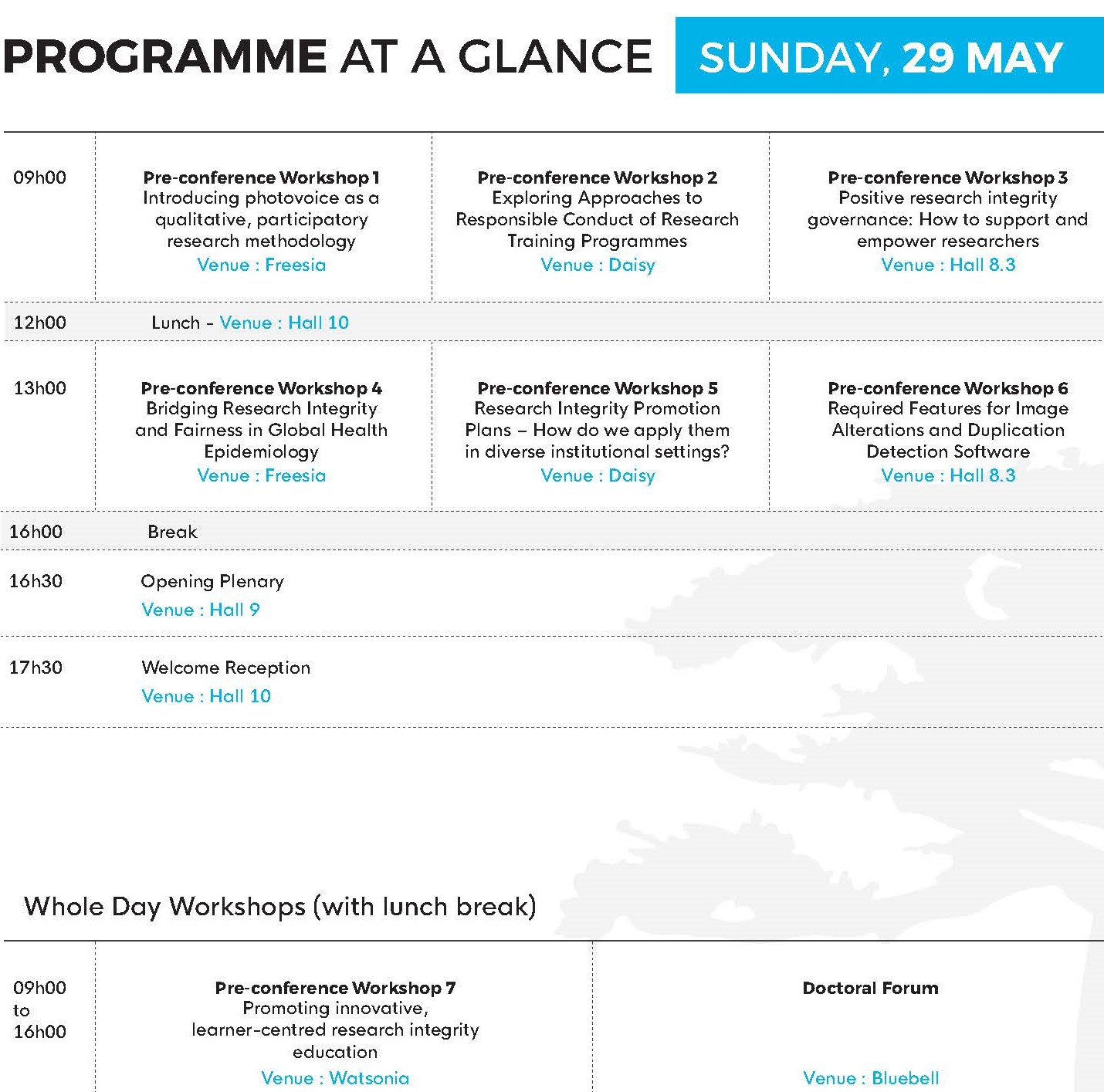
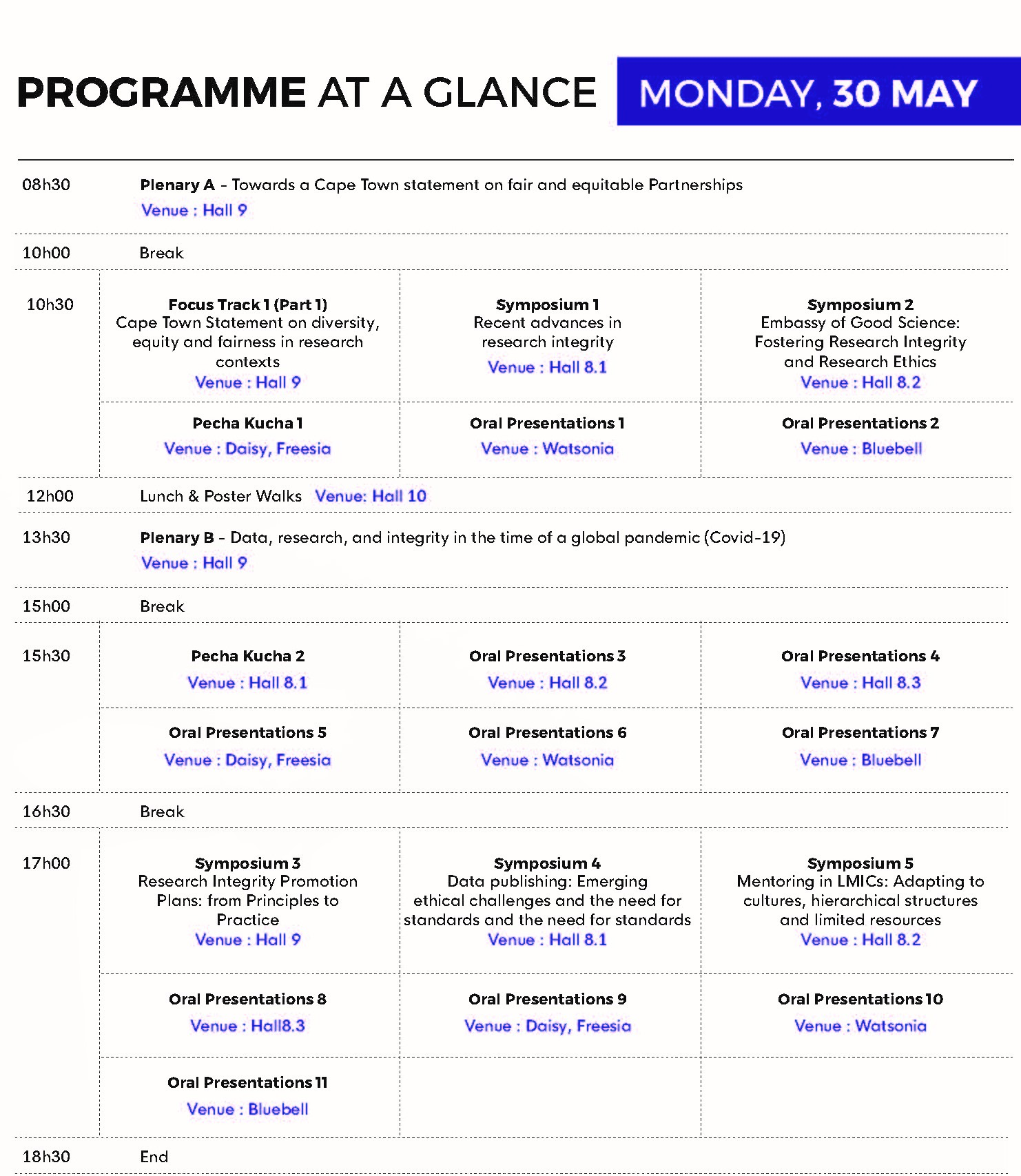
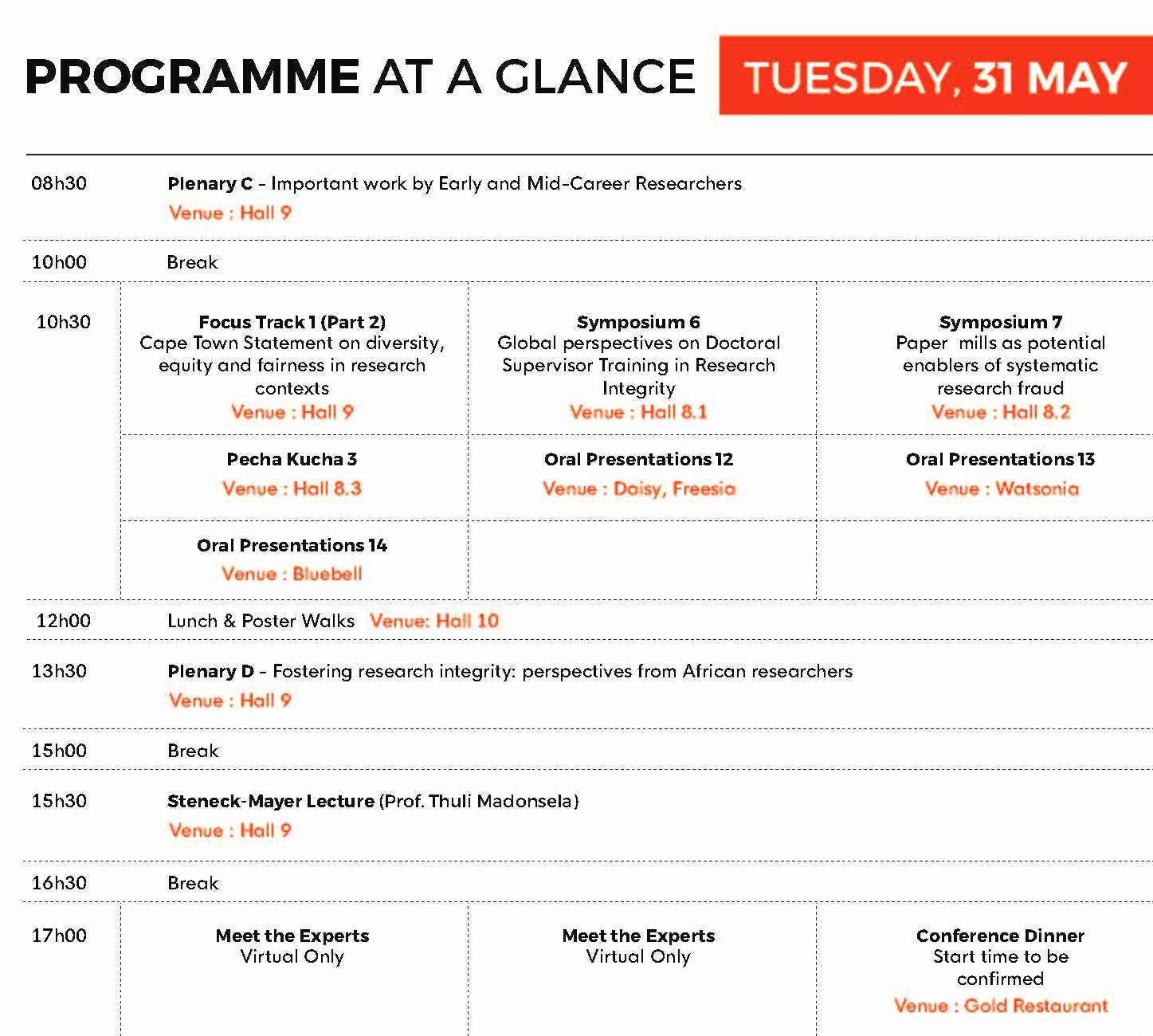
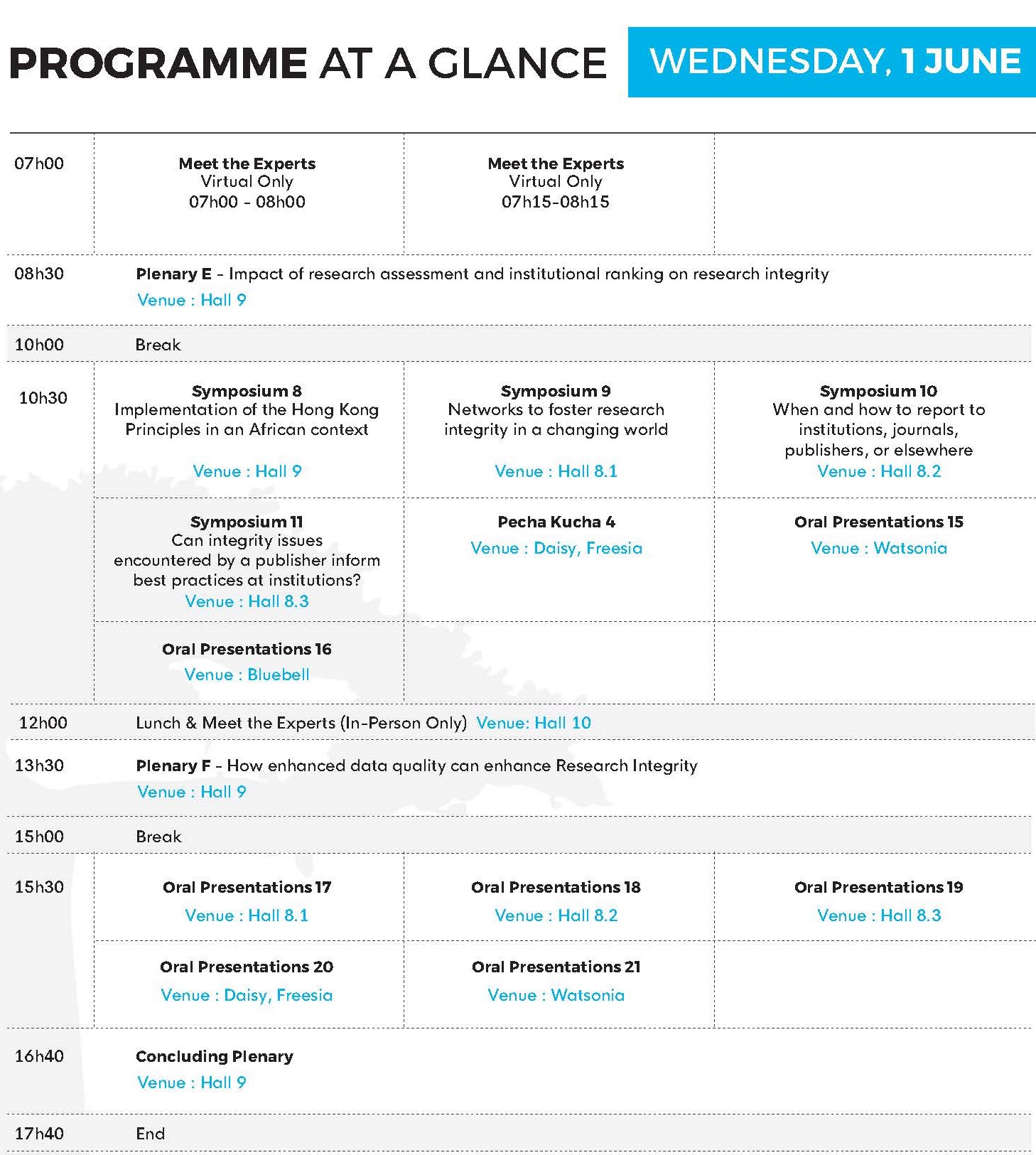
7th World Conference on Research Integrity © 2020. All rights reserved. | Privacy Policy
Conference Secretariat Paragon Africa | Email: wcri2022@paragonafrica.co.za

